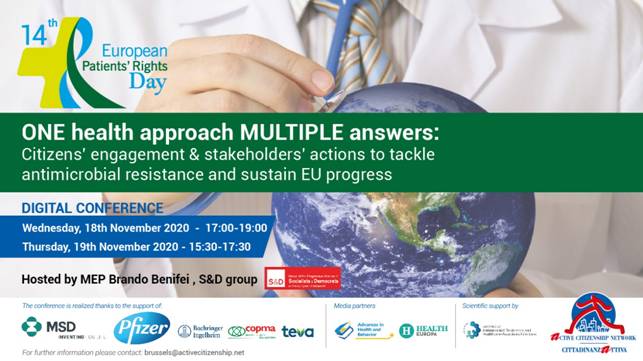Brussels, 19 November 2020
Antimicrobial resistance: one of the ten most urgent threats for the Global Health but totally underestimated among the populations; more dangerous than car accidents & cancer but not enough prioritized in the EU and National public health policies. Interlinked with Covid-19 pandemic but almost ignored by the media. The world is losing its most powerful tool in healthcare: antibiotics. By 2050 super bacteria could cause 350 million of deaths and meantime research is still waiting for EU incentive mechanisms as well as an overall strategy to integrate the development of - and access to - affordable and quality antimicrobials.
Despite the fight against AMR requires policies focused on the prevention and extension of vaccinations, the health expenditure for prevention programmes are the “Cinderella” of the public health budget.
Patient engagement efforts on increase awareness on AMR are not accompanied by more widespread initiatives targeted to citizens: how do we behave at the supermarket with regards to foods produced “without any use of antibiotics”? What lies behind this label and why it should not be overlooked? How can we value our informed choices as consumers?
These are some of the paradoxes on AMR addressed in occasion of the 14th edition of the European Patients’ Rights Day, organized on 18 & 19 November 2020 in a digital format by Active Citizenship Network (ACN), the European Branch of the Italian NGO Cittadinanzattiva, during the World Antimicrobial Awareness Week.
The event was hosted by MEP Brando Benifei, and realized thanks to the support of MSD, Pfizer, Boehringer Ingelheim, Teva, Copma.
Considering the huge discrepancy between the severity of the situation and the low level of awareness of European citizens, talking on AMR would be desirable to avoid the return to the situation prior to Covid-19: this was, in synthesis, the main common message sent by the initiative that allowed to share concrete initiatives about patients’ engagement & stakeholders' actions to tackle antimicrobial resistance and sustain the EU progress.
Against this background, also some positive aspects were highlighted during the EU conference, that had the scientific support of the European Joint Action on Antimicrobial Resistance and Healthcare-Associated Infections (EU-JAMRAI):
- The promising “EU4Health Programme” promoted by the EU Commission, that aims to increase protection against global health threats, reduce inequalities in accessing health care and advocate prudent and efficient use of medicines such as antimicrobials. In this context, the civic monitoring on how the public resources will be spent and the level of accountability of the Institutions will be crucial.
- The commitment of the Members of the European Parliament of two different Interest Groups active on health issues: the “MEPs Interest group “European Patients’ Rights & Cross-Border Healthcare”, and the “Interest Group on Antimicrobial Resistance”. Indeed, the European Parliament can play a key role in boosting actions on AMR at European level and ensure that the European Commission and the Member States deliver on their commitments and implement effective policy responses to the AMR threat, a key cross-border health issue for Europe.
- The fight against AMR also involves the use of innovative sanitation systems, as testified by an Italian best practice that aims at reducing AMR and simultaneously guarantee savings for the health-care system.
- The "AMR Patient Alliance" promoted by the International Alliance of Patients’ Organizations (IAPO) and officially announced during the event. It represents a very encouraging EU initiative on AMR that, as a second step, needs to move towards a “Citizen AMR Alliance”, as suggested by the “One Health Approach”, in order to embrace the animal and environmental dimension apart of the human health as is crucial to involve the whole population.
- The impact that the empirical use - during the pandemic - of antibiotics will have over a potential increase of AMR, certainly needs to be taken into consideration in order to update AMR National Plans, that should prioritize the needs of elderly, as the so-called “Silent Tsunami” is one of the principal barriers to healthy aging.




